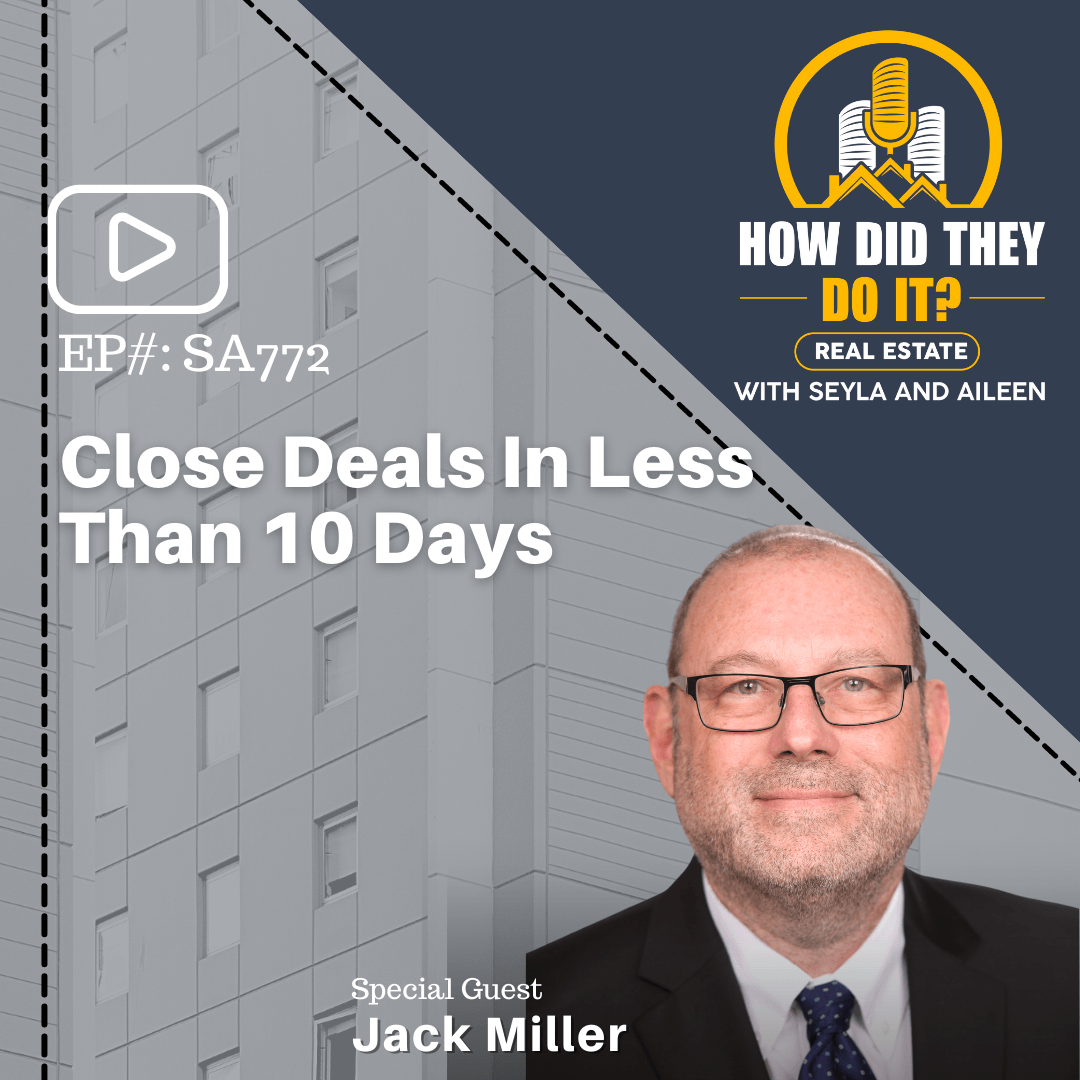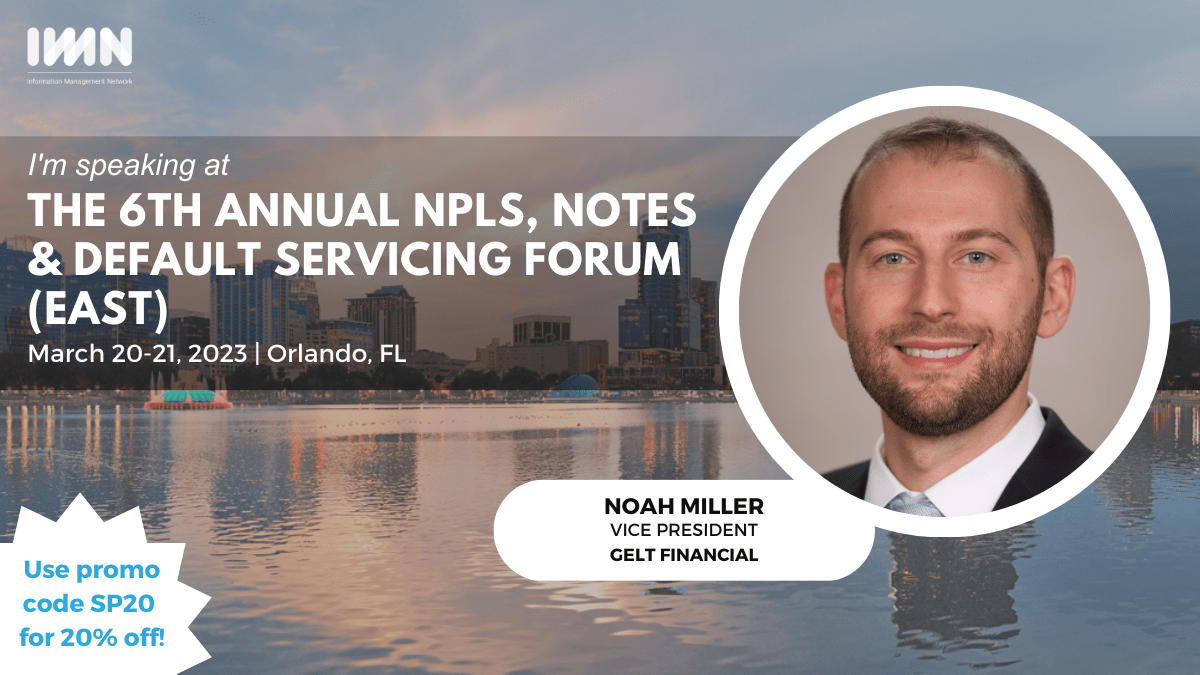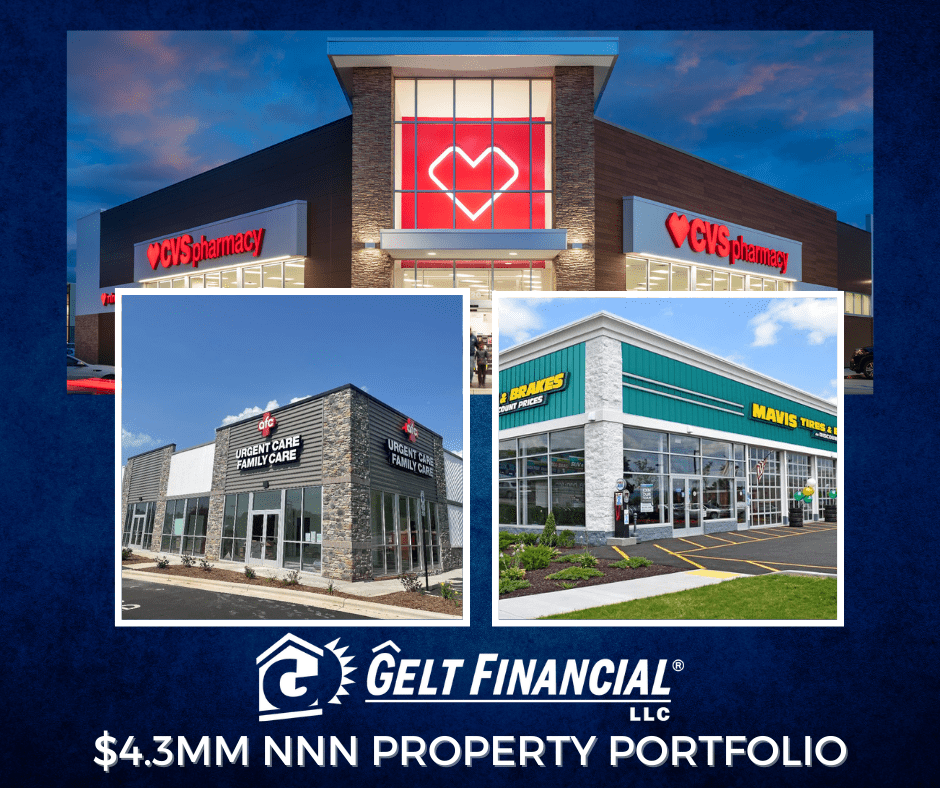Jack Miller and Marcy talk little about how real estate investors and mortgages brokers might want to ask for 100% financing? Its best to be set up for success and sometimes its the way you do it and in the preparation.
“Jack: Hey Marcy Berger, how are you?
Marcy: Good, how are you doing?
Jack: Good, good, good. I just realized I don’t have my work shirt on today, but we’ll fake it like this.
Marcy: Okay we’re going rouge today.
Jack: So, I want to make a little video on a topic. I’m going to call it ” How to Ask for 100% Financing.” You know, we do some deals that are 100% financing. Not every deal, again, not every deal, but some deals… Oh, you let me to turn off my phone? I’m sorry. I’m sorry, I’m making noise. Oh, I put on something. Oh, don’t forget to like our YouTube video and subscribe to the channel. I always forget that. So, I want to talk about, you know, a borrower sees maybe one of our videos. He’s 100% financing. You know, they take a course, “How to Buy Properties with No Money Down, 100% Financing,” but they don’t really present it to be candid with. Some don’t present it in the best way, you know?
Marcy: You know how to get 100% financing.
Jack: Yeah, so the typical is someone will call me up, and I’m sure you too are sending an email. So really, you know what happens is someone will call up and they say, “I have no experience, my credit’s lousy, I have no income. Oh, but I took a course for $299, and they told me I can get 100% financing. And, by the way, there’s no risk to you as the lender.” You know, as a lender, how do you think that really sounds? I’m being very honest with you. It sounds terrible. We have no confidence in somebody.
Marcy: Well, it sounds like they don’t know exactly what they’re doing.
Jack: Yeah, they don’t, they don’t. So really what I want to talk about on this video is if they’re looking for 100% financing, we do a lot of 100% financing deals. How you present it and how does it look from a lender. So instead of saying what I said, “I have no experience, I have lousy credit, I have no income, by the way, I’m going to live on your draw money for repairs, to take my family to Bermuda.” Which a lot of them do, look about it, look at my it from the lender’s point of view. Look at it from a different paragon. Maybe instead of saying I have no money and I have lousy credit, maybe you call up the lender and you say you have other collateral to cross-collateralize the loan with, or you and a partner are buying this, and the partner has other collateral, so you can cross-collateralize your loan and be fully protected. Remember, to be candid with you, all a lender cares about is protecting our investment. Look, honestly, we care about you, but we care about our money more. That’s just the reality, no matter what anyone says.
Marcy: So, let’s break it down to really, really simple. So, to get to 100% financing, exactly what Jack said: add other properties to the deal, which we call those blanket loans.
Jack: Cross-collateralization, blanket loans, seller seconds. Or another way is if you have the property under agreement of sale well below the market. So, give you a per—I’m just gonna talk numbers. It’s actually a deal I was just talking to the borrower. We did it a couple of years ago. A guy bought a property, I think it was an industrial property. It was our second or third deal from the borrower outside. I think it was one of the big—I think O’Hare in Chicago—and he bought it for, let’s say, 100 grand, and I think it was worth 200 or 250. So, he bought it below the market. So, if he would have called up and said, “Look, I’m buying a property for a hundred thousand,
I want a hundred thousand,” it doesn’t sound so appetizing from a lender’s perspective. It sounds very risky. But in this case, and a lot of this is semantics, it’s really presentation, but presentations important. Don’t think it’s not, it’s very important. In this case, what happened was he says, “Jack, I got a fantastic deal on a property that I’m going to be able to sell for 250,000. I only paid 100,000 for it. Would you lend me the hundred thousand?” And in this case, we did. We figured it out, we lent him the hundred thousand. He closed on the deal, and I think he sold it for two and a quarter (225,000) or 240,000 or whatever it was, we got paid off. So, there’s a difference in presenting it, if you would— that’s really what I want to focus on I don’t think people present it well. I think, to be candid, I don’t think it’s their fault. I just think no one really took the time to educate them. So, I’m not criticizing anyone, but so it’s the way you present it to the lender, let’s just use that example. If someone—you call a lender, you call Gelt or another lender and said, “Hey, I found this fantastic property, I think it’s worth 250,000, maybe it’s worth two and a quarter (225,000), I got it a steal for 100,000 dollars at an auction, will you lend me the 100,000 dollars on it?” We look at that as, give or take, a 50% leverage. So, you could look at it and say it’s a 100% loan to value, it is, but we look at it and say the property’s worth 200,000 and we’re going to lend a 100,000. So, it’s the way you present it, is a lot more—it’s very important. Another thing is, and I’m sure you run into this all the time; people all the time say, “it’s a no-risk deal, what do you have to lose?” You know, honestly, when people—when borrowers say that, like, I don’t—the purpose is not to criticize borrowers, it’s to educate borrowers and brokers.
Marcy: To educate and to present information.
Jack: Yes, yes, yes, yes. That sounds nicer. But when a borrower or broker calls up and says, “It’s no risk, you have nothing to lose, it’s impossible to lose money on this.” To be candid with you, a lender, it doesn’t come off so well. The reality is everyone walks down the aisle in marriage thinking their marriage is made in heaven and you know it’s blessed under the gods or the sun, but 50% of them don’t work out. You know, I don’t know the failure rates now, but prior to COVID, I think 70% of new businesses fail within two years. So, you know, when people say that “Oh, there’s no risk, you have nothing to lose, it’s impossible to lose,” but you’re not looking at the whole thing, to be candid with you being naive.
Marcy: Right, but you’ve been doing this a long time.
Jack: Well, I’m trying to use my experience.
Marcy: We’re just trying to tell you, like, what tools that you need.
Jack: Am I coming off too tough on people?
Marcy: Yeah, a little.
Jack: I apologize. I don’t need to come too tough. My point isn’t to come on tough on them, it’s to try to educate them. There’s risk in everything you do. If you walk outside, there’s risk you’re gonna get hit by lightning, and people who don’t realize the risks of doing things, they don’t have the experience level. So, what I’m saying is, if you don’t have the money, which nothing wrong with that, by the way, I started out not having money and I still do 100% financing deals, we’re getting ready to buy—I don’t want to go into details yet because it’s not sign yet, but we’re negotiating a PSA which we’re getting 100% financing. So, nothing wrong with it all, I use it all, but really what I’m saying, you’re right, Marcy. I’m saying that some people who take these courses, it sounds not nice but are naive. I’m trying to help them. I’m taking my time to help them.
Marcy: We’re just trying for you to present all the right information to us, then we can make a decision whether it is risky or it’s not.
Jack: So, my point is there’s risk in everything. So, when you say to a lender there’s no risk or you can’t lose or blah blah blah, it doesn’t sound great. What I would say instead is because of x, y, and z, your risks are mitigated, or your risk should be acceptable risk because there’s other collateral or because the seller is holding a big second mortgage, your risks are minimal. So again, you have to…
Marcy: Or there’s like a really long-term tenant that’s been in there, there’s a long lease, there are so many different ways of looking at something and making it strong.
Jack: So, I would deal in the world of risk mitigation, which I think is much more realistic than, “Oh, I can’t lose.” There’s—you know, the reality is, there’s a million gurus out there who are selling all kinds of stuff on the internet and Twitter and all these places, how to make money and follow me and I do this, and I watch them on Instagram and Twitter and YouTube. I have to tell you, a couple of them are borrowers. In fact, we wound up foreclosing on one of them. You know, a lot of this is hogwash, I’m just going to be candid with you. You know, they’re selling you something, it’s not—it’s not as easy, and a lot of people lose a lot of money in real estate. The past 10 years, you know, have been fantastic, it’s been very hard to lose money. But just be a little cautious with it. But my point is, when you go to a lender, understand that a lender is going to see risks no matter what you say. You may not see the risk, you may be blinded because of your love of the deal and your desire to make money, and I’ve been blinded that way too. I want to make money and I want it to be a success so much that I’m blinded to the risk, but there’s risk. So, what I would do is when you’re talking to lenders and really or investors, investors talk about ways to mitigate the risks, talk about ways to minimize the risk, but recognize that there are risks in everything, right?
Marcy: Right, but when you gather all the information, what we’re trying to say to you is see the risks before you present the deal to a lender so that way you have all the information and you can come back and say, “Well, what about this? Or what about that?”
Jack: Be prepared. Marcy’s right. See the risks up front. Literally, make a checklist of the risk and figure out how those risks can be mitigated to a lender. If a tenant leaves, you’ll lease it to somebody else. If this happens, this will happen, you know, so on and so forth. You have enough cash reserves. The point, I guess my point is, there’s ways. There’s nothing wrong with getting a 100% financing.
Marcy: And we do offer it.
Jack: We do offer.
Marcy: Different circumstances.
Jack: I get it. When I’m a buyer, sometimes, sometimes I don’t, but be cognizant of how you’re requesting it and present yourself in the best light forward. And as I said in the beginning, don’t come off; If you come off not understanding the risks, a lender, whether it be Gelt or someone else, is going to say, “This guy doesn’t…”
Marcy: We are going to hesitate.
Jack: They don’t know what they’re talking about. But rather deal with the risks, identify the risks, know they’re there upfront, and find a solution to mitigate the risks. And this way, if something happens, you’ll be protected. And there’s a lot you can do to mitigate those risks. You know, we let’s talk about 100% financing. You know, so some of the ways we do it are seller seconds, cross-collateralization, blankets, that’s huge, huge.
Marcy: And we’ve even done deals where there’s been a lease-option purchase. A lot of those type of deals, the price that’s on it is from years and years and years ago. So, we’ll sometimes finance a hundred percent of whatever the sales price is from a lease option. And it’s a lot, it’s worth so much more now, so that’s why we’re comfortable with that.
Jack: And we, and a lot of private money lenders don’t look at loan-to-value per se. We look at leverage. So, the example I gave, a guy buying a property by the Chicago airport, he, again, remember he paid a 100,000, was worth 250,000, so that’s a great way to buy a property under the market. Now, you have to realize from a lender’s perspective, if you go on Zillow or Crexi or any of these places and it’s on the open market and you’re buying it for 200 grand, don’t just tell the lender, “Oh, it’s worth 400 grand,” you know…
Marcy: You know because, it’s out there.
Jack: Yeah, and you know there has to be a reason why you’re buying it under the market. Again, if the property needs work, if it’s really an off-market deal, or if it’s an auction. But every deal is not an off-market deal. I—
Marcy: And they are getting harder and harder to find.
Jack: I was talking to someone the other day and I said, “Where’d you get the deal?” They said, “An off-market deal.” I said, “How did you find out about it?”, “A realtor called me about it.” And I said—
Marcy: And it’s not off the market.
Jack: Yeah, I Googled it. It was on the market, you know. So just because someone says it’s an off market, so there has to be a reason to it. Really, you know what this all comes down to, Marcy? Honestly, educate themselves. You have to be educated. Tell the truth also. It would be foolhardy and a mistake to not tell the lender the whole story or your investor because I’m assuming you’re going to be pitching this deal to capital investors, and we do that as well. Tell them everything upfront would be full-heartedly, what’s… what’s… what’s It’s full-heartedly. Full-hearted.
Marcy: We’re all in.
Jack: Well, whatever the word is, don’t assume they won’t find out because a lot of times they will find out. And I tell you, a lot of deals die because borrowers don’t tell the— and brokers aren’t candid with their lenders up front. If you’re candid up front, you’ll get the deal a little more. Educate yourself. That’s really what it comes down to. Learn the values in the neighborhood you’re buying, learn the rental absorption, learn expenses, what a fair expense load is for the property. What else should they learn? Learn how to calculate the numbers, get service coverage.
Marcy: Absolutely, and know your borrower. Like when you take a client on, and you need to know their whole story.
Jack: Well, that’s true. If you’re a broker, educate yourself. But mortgage borrowers and real estate investors need to educate themselves. And educating yourself is not by just taking…
Marcy: It’s going to make you not make a mistake. I mean, that’s the truth. Like you don’t want to make a mistake, you don’t want to lose money, you want to make money. To know all your facts up front before you make a decision or present it to a lender.
Jack: Okay, so we’re into this for 10 minutes or so. We wasted 20 minutes of our time. I don’t say wasted. How do we do? I was too tough on people?
Marcy: Nah, I think you’re all right. We’re just speaking our truth. And the truth is going to educate you and make you more successful.
Jack: Okay, so how do we summarize it? Ladies first, you give your summary. That all someone is…
Marcy: When you present the deal to whatever lender, make sure you know what you can do with it. I mean, if there is other collateral, if the property is valued more than you’re paying for it, you know, know your risk. Just know your risk, look at every angle of the deal. And when we ask questions or any lender, have an answer and know what you’re talking about. Know what you’re talking about. I think that’s the most important thing.
Jack: What are we talking about?
Marcy: We’re talking about…
Jack: I’m joking. I know, I know. Again, Marcy’s right. Know what you’re talking about. Educate yourself. Don’t take shortcuts. Too many people take shortcuts and it’s gonna come back and bite you. You’re gonna lose money. It’s going to come back and bite you and you’re going to waste time.
Marcy: And no one wants to lose money. I mean, the whole point is to make money.
Jack: You can. I want to be at point. I’m going to look clear as closest. You can get— you’re going to see all my age marks. You can get 100% financing, whether it be through a lender or through an equity partner or a JV partner. You absolutely can. Tons and tons and tons and tons of deals are done that way. In fact, there’s, you’d be amazed at how many deals are done that way. But you really have to be on your game. Educate yourself. Know what you’re doing. Know the risk. Don’t be naive. Don’t be full-heartedly. Don’t you know?
Marcy: Don’t believe anyone. I mean, you really have to check their facts. I’m serious. It’s like, it’s amazing what goes on. You have to watch everything. You really do.
Jack: Okay, so look, I hope we provide some education for you. Again, if I was too tough on you, I apologize. I don’t mean to be critical of any person, but, you know, I want everyone to be successful. So, again, I didn’t mean to come off too tough. I just like to see people succeed and you’re going to have to pay the price. Don’t try to take shortcuts for it. Remember, we’re doing non-bank loans. Let’s selfless plug. Self-understood our sign there, check us out. Gelt Financial. Non-bank loans, $100,000 to $3 million. Bridge, short-term, one-to-five year deals, JV equity, debt and equity. We’ll do auction financing, we’ll do 100%. We love working with real estate investors. We absolutely love it. They’re just invigorating. They’re smart, they’re creative. They’re what America’s built on, and I think we need to encourage them. And that’s what we’re trying to do here. So, like the YouTube and leave your questions and comments and we’ll answer them. We leave everything else.
Marcy: Nope, everyone have a great day and on to the next subject.
Jack: On to the next subject. Take care.”
Category: Borrowers
Tag: 100% financing

























